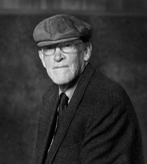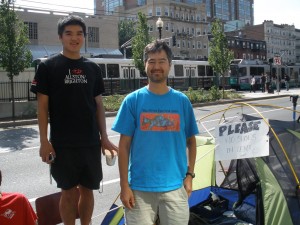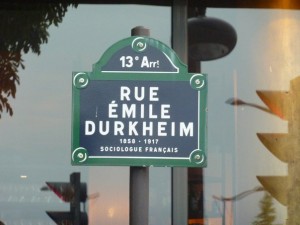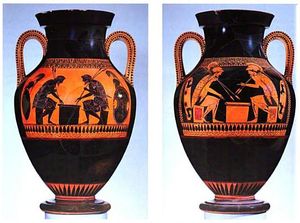October 12, 2010 at 10:17 am
NB: The University is following a Monday schedule today following yesterday’s holiday, so there are no Tuesday lectures this week.
Upcoming Core Lectures
CC105: Professor Jackson on Quantum Mechanics II: Probability 10/14
CC203: Professor Swartz on Social Forces: The Invisible Hand 10/14
Activities
- Join Core faculty on Fridays in September and October for fun walking tours in and around Boston. This Friday, October 15, Professor Cirulli will take students to Boston’s North End to learn the secrets of Boston’s most colorful neighborhood. Pizza will follow. Sign up in CAS 119. No cost for events, but bring your BU ID and a pass for the T. Meets at 3 PM in CAS 119.
- Core Film Series presents The Matrix on Monday, October 18, as a complement to questions about the true nature of illusion and reality considered in Core studies. CAS room B-36. Dinner at 6:00 – film at 6:15
Announcements
- The CC101 MFA gallery guide is now available online for download.
- All students: The Core Writing Center is now open. Writing Tutors are available for 30 min appointments in CAS 129 M-F, from 10-1 and 2-4. Sign up for an appointment in CAS 119.
Make sure to bookmark the Core calendar at http://bu.edu/core/calendar.
Get connected with Core!
Check out our new blog: http://bu.edu/core/blog
Find us on Facebook: http://facebook.com/BUCore
Follow us on Twitter: http://twitter.com/corecurriculum
Do you have any ideas, or comments about Core activities? Email Professor Kyna Hamill.
By CAS Core Curriculum
|
Posted in e-bulletin
|
Tagged e-bulletin
|
October 12, 2010 at 10:00 am
Andy Kroll, in doing an investigative report on the growing list of unemployed and underemployed Americans, takes the case study of Rick Rembold to give a face to the economic struggle of aging middle-class Americans (via TomDispatch):
"Wouldn’t that be better than no job at all?" I ask.
Rembold gnaws on the question. "I can't afford my home at $8 or $10 an hour," he finally replies. Right now, he’s getting by on unemployment checks, a small inheritance from his mother that's rapidly dwindling, and loans from family members. Still, he'd rather keep trolling the job boards in the hopes of finding something offering a living wage. "I've got a mortgage to pay, for Christ's sake," he told me. The few openings he sees with good pay, however, involve odd hours, dusk-to-dawn shifts that would mean he'd almost never see Terri, whose schedule at an aluminum company in Elkhart is early morning to mid-afternoon.
And then, under the dollar signs lurks something else: self-respect. Unlike his father, Rembold never went to college, and doesn't consider himself too good for service-sector jobs. But he visibly agonizes over the fact that, as a 56-year-old man with decades of experience, he's competing with people half his age for low-wage jobs. After all, as a machine operator fresh out of high school at White Farm Equipment, he earned $8.64 an hour. That was 1976. Adjusted for inflation, that's equivalent to $42.42 today. No wonder the man's reluctant to flip burgers or trim hedges for $9 an hour.
[...]
In the end, facing an economy that may never again generate in such quantity the sorts of "middle class" jobs Rembold was used to, what we may be seeing is the creation of a graying class of permanently unemployed (or underemployed) Americans, a genuine lost generation who will never recover from the recession of 2008. As Mike Konczal and Arjun Jayadev of the Roosevelt Institute, a left-leaning think tank, recently wrote, unemployed workers today are more likely to abandon the workforce than find work -- something never before seen in four decades' worth of labor data. "These workers need targeted intervention," they concluded, "before they become completely lost to the normal labor market."
In considering inequality and stratification, CC203 students and alumni would do well to ponder cases like this. How much of Rembold's struggle is his fault? How much has to do with market and social forces, and how do we help these people (or do we help them best by not helping at all?) Feel free to discuss this on the EnCore Facebook group.
By CAS Core Curriculum
|
Posted in Great Ideas, Great Questions, Other Publications
|
Tagged Andy Kroll, CC203, Economy, Inequality
|
October 8, 2010 at 3:56 pm
In coordination with Professor Scully's introduction of the culture of ancient Greece -- a domain where the students of CC101 will discover the foundations of Western thought -- the Core blog today is featuring an analect that reminds us not to blame those in power for the struggles we encounter as we progress on our academic journey:
My word, how mortals take the gods to task!
All their afflictions come from us, we hear.
And what of their own failings? Greed and folly
Double the suffering in the lot of man
– Zeus, Homer’s The Odyssey (Book 1, lines 48-51) translated by Robert Fitzgerald
By CAS Core Curriculum
|
Posted in Analects
|
Tagged Analects, CC101, Robert Fitzgerald, The Odyssey
|
October 6, 2010 at 4:23 pm

Each year, the Core students begin their study of the Humanities with the epic of Gilgamesh, in a version translated by the poet David Ferry. This Thursday, October 7, Prof. Ferry will be giving a reading of his work, at an event sponsored by the the Poetry Reading Series at BU.
All are welcome to attend, to hear this masterful literary artist read his writing, and to engage in conversation with the man himself. This event is free and open to the public, and will begin at 5 pm in the Katzenberg Center on the 3rd Floor of the College of General Studies.
From the Series webpage:
David Ferry is the author of Of No Country I Know: New and Selected Poems and Translations, winner of the 2000 Rebekah Johnson Bobbitt National Prize for Poetry and the Academy of American Poets’ Lenore Marshall Poetry Prize. He is the translator of Gilgamesh (1992), The Odes of Horace (1998), The Eclogues of Virgil (1999), The Epistles of Horace (2001), winner of the Landon Translation Prize, and The Georgics of Virgil (2005), all published by Farrar, Straus and Giroux. Ferry’s other awards include the Sixtieth Fellowship of The Academy of American Poets, the Teasdale Prize for Poetry, the John Simon Guggenheim Foundation Fellowship, the Ingram Merrill Award, and the William Arrowsmith Translation Prize from AGNI magazine. In 1998 he was elected a fellow of the American Academy of Arts and Sciences. He is the Sophie Chantal Hart Professor Emeritus of English at Wellesley College and a Visiting Lecturer in Creative Writing at Boston University.
*
Click here to read an interview with Prof. Ferry, published earlier this fall on the Core Blog.
By CAS Core Curriculum
|
Posted in Events
|
Tagged David Ferry, poetry, reading
|
October 6, 2010 at 3:29 pm
 David Green is a professor in the Core Curriculum in Boston University. He provides inspiration not only for Core students, but for students in the CAS Writing Program as well. He is also the faculty advisor for the Core theatre group, Calliope. Just this past spring, Boston-based Pen & Anvil Press published David Green’s most book, The Garden of Love and Other Stories. There have been many positive reviews, including this one by Christopher M. Ohge:
David Green is a professor in the Core Curriculum in Boston University. He provides inspiration not only for Core students, but for students in the CAS Writing Program as well. He is also the faculty advisor for the Core theatre group, Calliope. Just this past spring, Boston-based Pen & Anvil Press published David Green’s most book, The Garden of Love and Other Stories. There have been many positive reviews, including this one by Christopher M. Ohge:
Overall, the patient reader will find pleasure in these superb romantic meditations on a world filled with things, decay, and memories. In the spirit of Blake, the power of the imagination is celebrated; and, in the spirit of Samuel Beckett, a feeling of doom lurks beneath these well-structured and concise sentences.
"Sometime of the Night" is a story from the same collection, and deals with many of the themes encountered in the Core -- identity, home, imagination, even Penelope's dream of the eagle from The Odyssey.
Have you had a discussion section with Prof. Green? Did his creative writing provoke creative thinking of your own? Don't keep your thoughts confined to the classroom or to yourself -- share them with other students via the EnCore Facebook page
Related links:
By CAS Core Curriculum
|
Posted in Core Authors, Great Personalities
|
October 5, 2010 at 4:42 pm

Greg Hum and Nathan Phillips at Park(ing) Day 2009
The Core takes pride in the people who help keep the program running. One of those people is Professor Nathan Phillips, a course coordinator for CC106: Biodiversity. As part of an ongoing series on going green, BU Today offers a look into his almost completely off-the-grid lifestyle:
Nathan Phillips, a College of Arts & Sciences associate professor of geography and environment, is a somewhat reluctant poster boy for green living.
“I don’t claim to be fully free of all energy sources in the office at all times,” he says. His office’s heating and cooling are of course regulated building-wide.
But Phillips, who is also director of the Center for Energy and Environmental Studies, is a model for those who aspire to a lifestyle that takes less and gives more back to the Earth. Even though he and his wife have two school-age children, they downsized their automobile stable from two cars to one, joined Zipcar, and made a commitment to bike to bikable destinations. The family grows herbs, tomatoes, raspberries, and Concord grapes in raised beds and tosses organic waste in a compost bin in the backyard.
You can read the full story and watch a short video supplement on the BU Today website. He manages to make green living seem perfectly doable, and even advantageous! Discuss what small steps you take to increase sustainability on the EnCore facebook group.
Related links:
By CAS Core Curriculum
|
Posted in Great Personalities
|
Tagged CC106, faculty, sustainability
|
October 5, 2010 at 9:42 am
 Our own Prof. Sassan Tabatabai will be reading works from the Persian canon as well as his own poetry, at a celebration of Mehregan, a Persian harvest celebration, to be held this Thursday, October 7th. As many Core folks may already know, Prof. Tabatabai is a poet and translator whose work has appeared in a number of publications. He is the author of Father of Songs: Rudaki and his poetry (Rozenberg/Purdue U.P., 2008) and the forthcoming Uzunburun: Poems (Pen and Anvil Press, 2010). He also serves as Poetry Editor of The Republic of Letters.
Our own Prof. Sassan Tabatabai will be reading works from the Persian canon as well as his own poetry, at a celebration of Mehregan, a Persian harvest celebration, to be held this Thursday, October 7th. As many Core folks may already know, Prof. Tabatabai is a poet and translator whose work has appeared in a number of publications. He is the author of Father of Songs: Rudaki and his poetry (Rozenberg/Purdue U.P., 2008) and the forthcoming Uzunburun: Poems (Pen and Anvil Press, 2010). He also serves as Poetry Editor of The Republic of Letters.
His reading will be part of a larger evening of events sponsored by the Persian Students Association, and begins at 7 PM in the Faculty Dining Room at the GSU. For the price of admission -- $7 at the door -- attendees will experience Persian food, music and poetry.
The poem below, a Tabatabai original, appeared in the Spring 2010 issue of the Core journal.
"Garden of Eden"
Pink bougainvilleas climb the wall
behind the round table
where we always sit.
It is the bright tapestry that frames
our evening photos:
wine-weary eyes,
worry-less smiles.
It is the backdrop of our laughs.
By the window, red hibiscus
point their flutes at the sea.
They are trumpets of dawn
and open with the sun
to reveal points of golden pollen
that stain the shoulders of my shirts.
On the blue horizon, the seam disappears
between the Mediterranean and the sky.
The rosemary bush in the corner
attracts a flock of intoxicated
butterflies and bees,
oblivious to the stalking lizard
that like some diminutive dinosaur
is coiled to pounce on its prey.
Along the front gate,
jasmine and gardenias
pour forth pillars of perfume,
both upon greetings and farewell,
to this garden by the sea.
By CAS Core Curriculum
|
Posted in Activities, Events, Great Personalities
|
October 4, 2010 at 4:18 pm

Photographer Logan Gowdey (Core '10, CAS '12) is at present studying in Paris.
He is blogging at http://baguettesinbed.tumblr.com.
By CAS Core Curriculum
|
Posted in Great Photograph
|
October 4, 2010 at 4:07 pm
As autumn descends upon us, we consider an analect for today which reflects our longing for the diminishing sun—and how we should consider our lives in the grand scheme, not necessarily just on our proximity to warmth:
I know no one. But nevertheless I pity the poor wretch even though he is my enemy, because he has been yoked harshly to the harness of a dreadful delusion. Yes, I ponder that man’s lot no less than my own. For I see that we are nothing more than ghosts -- all we that live -- or vacuous insubstantial shadows.
– Ajax, in Sophocles’ Ajax

About this image: "Andokides Painter, Achilles and Ajax playing a dice game (Attic bilingual amphora), from Orvieto, Italy, ca. 525-520 BCE. Black-figure side (left) and red-figure side (right). Approx. 1' 9" high. Museum of Fine Arts, Boston." As appears in Gardner's art through the ages: a western perspective, by Helen Gardner, Fred S. Kleiner, and Christin J. Mamiya (2006), page 108. A few comments from our art history major student office assistant, Sarah Cole:
Amphorae were commonly used as funerary markers and storage vessels in Ancient Greece. This amphora shows great craftsmanship and skill. Before the Black Figure and Red Figure styles were created, the artist would paint the image onto the vessel with slip. With the new techniques, the image could be scratched onto the vessel, which allowed more detail. This image shows two great warriors at a moment before battle. Often, artists created scenes of great battles or mythology for the main image. The figures hold their spears but the shields stand to the side. On the Black figure vase, the shield to the right is a Dipylon shield, which was used by soldiers in the Bronze Age.
By CAS Core Curriculum
|
Posted in Analects, Art
|
Tagged Analects
|
October 4, 2010 at 10:32 am
Upcoming Core Lectures
CC101: Professor Scully on the Culture and Religion of Ancient Greece 10/5
CC105: Professor Carey on Nuclei and Radioactivity 10/5
CC105: Professor Jackson on Quantum Mechanics I: Wave/Particle Duality 10/7
CC201: Professor Coelho on Claudio Monteverdi 10/5
CC203: Professor Shipman on The Social Contract 10/7
Activities
- This evening! Tonight, Monday, October 4, Professor Robert O'Meally of Columbia University will speak about his book Romare Bearden: A Black Odyssey. Romare Bearden was an African-American artist and writer whose collage series "A Black Odyssey" was based on Homer's classic epic. This talk is part of the Core Curriculum's Lecture Series on the Insight & Inspiration of Core texts. A light reception will follow. 5:30 PM in the Castle, 225 Bay State Road. Free and open to all.
- My Favorite Boston! Join Core faculty on Fridays in September and October for fun walking tours in and around Boston. Next Friday, October 15, Professor Cirulli will take students to Boston's North End to learn the secrets of Boston's most colorful neighborhood. Pizza will follow. Sign up in CAS 119. No cost for events, but bring your BU ID and a pass for the T.
- In order to close off their reading of the Hebrew Tanakh, a group of Core students has organized a screening of The Prince of Egypt this Wednesday, October 6 at 8 PM, in CAS room 224. Look for a sign at CAS 119, and feel free to bring snacks and friends.
Announcements
- For CC101 students: The MFA audio and print guide is now available for download.
- For all students: The Core Writing Center is now open. Writing Tutors are available for 30 min appointments in CAS 129 M-F, from 10-1 and 2-4. Sign up for an appointment in CAS 119.
Make sure to bookmark the Core calendar at http://bu.edu/core/calendar.
Get connected with Core!
Check out our new blog: http://bu.edu/core/blog
Find us on Facebook: http://facebook.com/BUCore
Follow us on Twitter: http://twitter.com/corecurriculum
Do you have any ideas, or comments about Core activities? Email Professor Kyna Hamill
By CAS Core Curriculum
|
Posted in e-bulletin
|
Tagged e-bulletin
|


 Our own
Our own 

